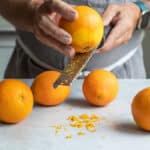
How to Zest an Orange
Whether you use a zesting gadget or a common kitchen tool, learn How to Zest an Orange. With 5 ways to tackle the task, add some fresh orange flavor to cocktails, desserts, salads, and seafood.
Servings 6 servings (1 tsp each)
Calories 10kcal
Equipment
- Microplane grater (My favorite! Use this for zest, cheese, nutmeg, garlic, and chocolate)
- Vegetable peeler (My go-to peeler for thick strips of zest and for peeling potatoes or any vegetable)
- Paring knife (A super-sharp paring knife is a kitchen staple that works great for zesting citrus)
- Box grater (Use the fine-grater side for citrus and try the coarse and medium grates or slicing side for vegetables, herbs, and cheese)
- Channel knife (This 2-in-1 tool zests or makes strips for citrus garnishes)
Instructions
To zest an orange with a microplane:
- Hold the grater in one hand and the orange in the other over a cutting board or clean work surface. Going in one direction, push the orange away from you across the rough side of the grater, removing the colorful part of the fruit, exposing the pith. Gently rotate the orange as you go to get all of the zest you can from each fruit.
To zest an orange with a vegetable peeler:
- Hold the orange in one hand and the peeler in the other. Beginning at the top of the fruit and working your way around the orange, use the peeler to cut into the skin and carefully remove the peel in thick, wide strips. Avoid going so deep as to remove the white pith.
To zest an orange with a paring knife:
- Hold the orange in one hand and the knife in the other. Beginning at the top of the fruit, cut into the skin and carefully remove the peel in strips, working your way around the orange. Avoid going so deep as to remove the white pith.
To zest an orange with a box grater:
- Place the grater over a cutting board or clean work surface. Holding the box grater by the handle firmly with one hand, and the orange in the other, push the orange away from you across the rough side of the grater, removing the colorful part of the fruit, exposing the pith. Gently rotate the orange as you go, to get all of the zest you can from each fruit.
To zest an orange with a zesting channel knife:
- To make zest, hold the orange in one hand and the zester in the other. Starting at the top of the orange, press the round blades into the skin and move them across the fruit, rotating so that you get all of the zest you can.
- To use a channel knife for garnishes, hold the orange in one hand and the channel knife in the other. Dig the tip of the channel-shaped blade into the orange at the middle, and rotate the orange so that you make one long, narrow peel.
To make an orange twist:
- Gently rotate a long strip of orange peel around a drinking straw, securing each end with pins to hold it in place. This can be done in advance; by the time your cocktail is ready, your twist will be beautiful and perfectly curled. Just remember to give it an extra twist over the drink, to release the natural oils over the surface of the cocktail.
Notes
- Oranges: Always begin by washing and drying your oranges. No matter what technique you use, don’t dig in too deep to the bitter pith or the juicy fruit. Use a light touch, and make sure you rotate the fruit so you don’t over grate.
- Yield: 1 large orange will yield about 2 tablespoons grated orange zest.
- Storage: Store leftover orange zest covered in the refrigerator for up to 4 days.
Nutrition
Serving: 1 tsp | Calories: 10kcal | Carbohydrates: 3g | Protein: 0.2g | Fat: 0.03g | Saturated Fat: 0.003g | Polyunsaturated Fat: 0.01g | Monounsaturated Fat: 0.01g | Potassium: 40mg | Fiber: 1g | Sugar: 2g | Vitamin A: 49IU | Vitamin C: 12mg | Calcium: 9mg | Iron: 0.02mg